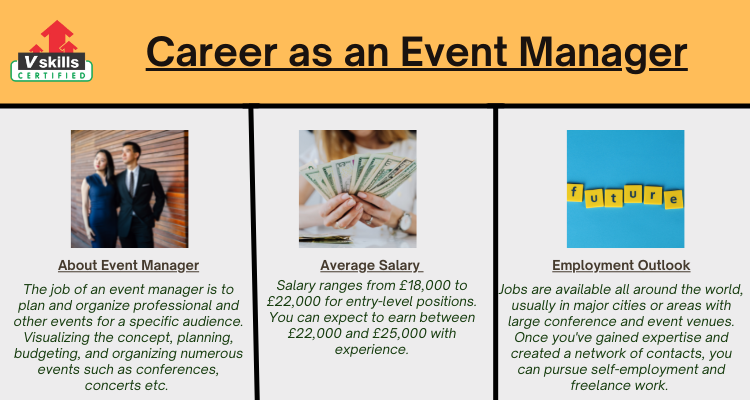Promotional, corporate, and social events are all planned and organized by event managers. They’re in charge of organizing a variety of events, ensuring that the target audience is engaged and that the event’s message is correctly communicated. The success of a brand or organization is heavily influenced by events. You’ll plan conferences, seminars, and exhibitions, as well as parties and corporate incentive trips, as an event manager.
Let us know about Career as an Event Manager!
About Event Manager
The job of an event manager is to plan and organize professional and other events for a specific audience. Visualizing the concept, planning, budgeting, and organizing numerous events such as conferences, concerts, stage shows, seminars, weddings, theme parties, product launch parties, exhibits, corporate seminars, and others are all part of the Event Manager’s job description.
It is a wonderful job choice because it does not require a large financial investment and provides a great deal of freedom and independence in the workplace. You can establish a great career in the field of event management if you have a passion for organizing events and solid organizational skills.
Roles and Responsibilities
As an event planner, you’ll need to be able to:
- engage with clients to determine their specific event needs
- prepare comprehensive event proposals (including timelines, venues, suppliers, legal obligations, staffing and budgets)
- After you’ve done your research on venues, suppliers, and contractors, you may negotiate rates and hire them.
- oversee and coordinate all event logistics and vendors (for example, venue, catering, travel)
- To publicize and promote the event, communicate with the sales and marketing teams.
- Organize and oversee all pre-event planning, including guest speakers and delegate packets.
- On the day of the event, arrange suppliers, answer client inquiries, and troubleshoot to ensure that everything works successfully and under budget.
Eligibility
Although a degree or HND in event management, hotel or catering management, leisure and tourism, marketing, or business is not required to become an event manager, it may be beneficial. Employers are far more interested in your abilities, personal characteristics, and industry experience.
You don’t need a degree to work as an events manager, and you may start as an assistant and work your way up as you acquire experience. The Level 2 Certificate in Event Planning may be beneficial, but it is not required. Some event managers come from backgrounds in marketing, hospitality, public relations, or arts administration.
Career Prospects
Senior Event Manager: The senior event manager is responsible for a variety of responsibilities. They handle all event requests and enquiries, as well as assisting with portfolio account servicing. The workflow, logistical assistance, and timeliness of project delivery are all managed by the senior event manager. They also develop and compile unique proposals that are tailored to the specific demands and objectives of each client.
Event Legal Executive: A legal executive’s work description is quite similar to that of an event legal executive. They are involved in client representation and contact, as well as attending court proceedings and taking care of the company’s and events’ legal documents. They would also look after issues like wealth and inheritance.
Budgeting & Finance Executive: They are in charge of creating successful budget models for the company’s numerous departments and departments as a whole. They also examine all of the company’s financial data, including sales, budgets, expenditures, and cash management.
Event Coordinator: Event organizers are in charge of planning the event from conception to completion. They meet with clients to iron out all of the logistics of the event, as well as scout and book a site.
Public Relation Officer: The company’s public relations strategy and campaigns are planned by the public relations officer. They also deal with public, press, and other associated organisations’ queries.
Event Production Head: They estimate, negotiate, and assign funds for events, as well as oversee all event-related labour. They determine the event’s quality and ensure that the company and the event run smoothly.
Average Salary
- Salary ranges from £18,000 to £22,000 for entry-level positions. You can expect to earn between £22,000 and £25,000 with experience.
- Managerial salaries range from roughly £33,000 to over £40,000 for senior managers or directors with substantial expertise and a strong track record.
- Salaries differ depending on your job, location, and industry. Performance-related compensation, commissions, and bonuses are examples of additional benefits that can help you earn a higher overall wage.
Employment Outlook
Although the work is primarily done in an office setting, you will be required to travel to meet with customers, partners, sponsors, venues, and other vendors. To plan and deliver the event, you may need to work outside, such as during an outdoor concert or festival. Jobs are available all around the world, usually in major cities or areas with large conference and event venues.
Once you’ve gained expertise and created a network of contacts, you can pursue self-employment and freelance work. You may need to spend time away from home, either in the UK or abroad, depending on the type of event you’re working on.
Resources offered by Vskills for Event Manager
Vskills offer Event Manager certification for all those interested in working in this field or in advancing their career. This certification course covers various objectives –
- Introduction to Events
- Why Events?
- Event Manager Skills
- Customer Relationship Management
- Structure of Events
- Event Process
- Event Planning
- Event Marketing
- Public Relations
- Site Planning
- Event Logistics
- Event Financing
- Human Resource Management
- Health, Safety and Security
- Monitoring and Evaluation
- Media Coverage of an Event
- Media Relations
- Event Branding
- Event Catering
- Suppliers
- Celebrities and Events
- Property Creation
- Social, Economic, Political and Developmental Implications
- Exhibitions
- Event Management Laws
- Event Management Taxes
- A Recap
- Case Study
Vskills also offers free practice tests and online tutorials to supplement the learning process. You can check them by clicking on the following links –
Other Resources for Event Manager
Before you can become an expert in desired areas, you must first build a solid base. Before you can move on to practical teaching, you’ll need to have the right applied skills. To gain better understanding of the domain, you can use the following tools:
- Firstly, Online Tutorials for Event Manager
- Also, Certification Courses from verified sources such as Vskills, Coursera, Udemy and so on.
- In addition, Online communities
- Moreover, Blogs and study material from experts in this field and many more.
Here are some examples of how you can improve your abilities:
- Freelancing
- Internships
- Apprenticeship programs
The above steps will help you to get this domain started. It’s a long way to go, however. You can take an advanced course to reach a new level of skills.
Discover the career opportunities and other prospects of Career in Event Manager. Hurry up and start preparing now with Vskills.in!




